Getting Back on the Water
Published on August 27th, 2017
Cliff Crowley shares a story in WindCheck magazine of how a quadriplegic rediscovered his love of sailing.
As a teenage member of Black Rock Yacht Club in Bridgeport, CT, Chris O’Brien was a superb athlete and junior sailor with a natural and immense attraction to both salt and fresh water.
Chris would become a sailing instructor, and an NCAA Division One swimmer at the College of Charleston. He would often join me as bowman on my Swan 44 Moondance for the Vineyard Race, or on John Esposito’s infamous J/29 Hustler.
That all changed one summer day on Block Island six years ago when Chris and friends were running down the beach, diving into the sea for one last dip before catching the last ferry home. Unfortunately, Chris suffered a catastrophic injury when his head hit a sandbar just below the waves.
He was airlifted to a hospital on the mainland and his new life as a quadriplegic had just begun. Over the next few years we stayed in touch, and I followed his rehabilitation and his exhaustive and demanding physical therapy, which continues today.
When the results of Chris’ hard work started to show in the early years, I had mentioned some adaptive sailing regattas to him, but it was too soon. However, this winter we bumped into each other in a local pub, and when Chris zoomed over in his wheelchair to say hello, I said, “If you can do that, you can push a tiller back and forth and you can sail.”
Chris enthusiastically agreed it was time, and we would enter the Robie Pierce One-Design Disabled Sailing Regatta. I said, “Don’t worry, we’ll take it easy. Chris replied, typically, “The heck with that. I’m going for the win!” My skipper had issued my orders.
The Robie is sailed in Ideal 18s fitted with bucket seats and multiple harnesses. Two adaptive sailors are strapped into permanent positions at the helm and mast, with a third able-bodied crew to assist. It’s very competitive, with top Paralympic racers from around the country, all recovering from or managing various physical conditions and injuries. Chris would be the least physically mobile sailor in the 20-boat fleet.
Our well intentioned plans for practice sessions never materialized. Chris had not even sat in the boat, and I was having sleepless nights before the regatta. Had I promised too much? Could we actually do this? Will the boom clear his head on jibes? Will I slip and fall on his legs and break them? What did I get myself into?
Chris is 6’1”. Imagine a boom coming at you and whizzing over your forehead, and you can’t even duck or raise your hands to protect yourself. I put a hockey helmet in my gear bag just in case, but Chris’ father and I both knew he’d never wear it.
I learned of the dozens of daily challenges quadriplegics and their families face every day, and all of the other sailors were facing similar situations. We wondered why some skippers were straddling their tillers and facing aft on downwind legs. Well, that’s how many blind sailors feel the wind on their face and adjust course with their knees. Try trimming a jib that last inch or so when muscular dystrophy continues to sap your arm and grip strength a little more each season.
As we sailed off our first day waving to our support team, our jib trimmer yelled out, “Damn!” I asked, “What’s the matter?” He said, “I left my leg on the dock!” In a half century of boating that’s one I hadn’t heard. “Forget it,” I said. “You won’t need it unless we need to row in.”
These very brave people all have one thing in common. They overcome daily challenges, on both land and sea, undeterred and with a smile, and without complaint. They are all simply awe inspiring.
Many thanks to the dozens of American Yacht Club and Larchmont Yacht Club volunteers, and regatta chairs Bill Sandberg, Buttons Padin and Siobhan Reilly, who in many pre-race phone calls said, “You get him here and we’ll make it work!’”…and “Don’t worry. If it’s over 10 knots we don’t sail.” Bah! The first two gusty days we saw 18-20 knots!
Chris may not be very mobile, but he’s young, strong, determined, and competitive. Being strapped into a bucket seat as you heel over leaning backward with water whooshing by inches from one’s ear takes getting used to, and trust in your crewmates, but mostly it takes courage.
The first two days were survival mode for us, but I wouldn’t let Chris’ mom know that. She eagerly awaited his return on the dock each day, dry and in one piece. Chris managed the tiller virtually the entire weekend. The few times he asked for assistance were because I was concentrating on the front of the boat and had forgotten about him, because he’d been doing so well.
Once or twice I grabbed the tiller and swung it to avoid a collision, violently jerking his arm and shoulder. I’d forgotten his hand was Velcro-ed to a snow shovel handle we’d duct taped to end of the tiller. Sorry about that!
I checked regularly and Chris always had a huge grin. It’s the smile you can only make on the water, sailing at hull speed in close racing…the ‘sailing smile’ he had not sported in six years.
We finished in the upper half of the fleet. A wildly successful regatta for many reasons, mostly because Chris was back on the water doing what he loves. Many new connections were made with sailors in this community, and we learned of other adaptive regattas and programs around the country.
I’m pleased to say Chris is looking forward to his next regatta, squeezing it between his classes at Harvard University where he expects to graduate next year. You can follow Chris’ adventures at facebook.com/ChrisOBriensDeterminationPage.
As we sipped post-regatta drinks on the beautiful AYC patio, pondering our next adventure, Chris happily declared, “I will not be going five years and 310 days between regattas again!” We both learned a lot that weekend, myself more than anyone.
WindCheck is a monthly magazine devoted to sailors and boaters in the Northeast. Every issue features those who race, cruise and learn to boat in the region.


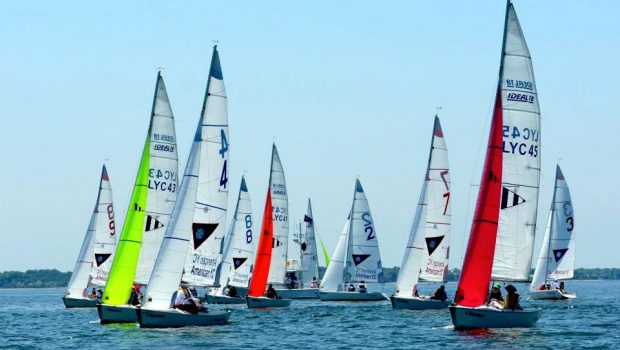
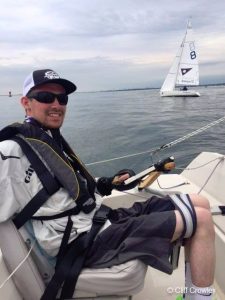


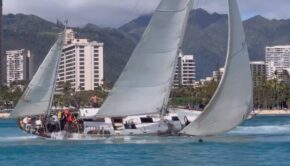
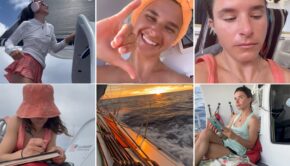
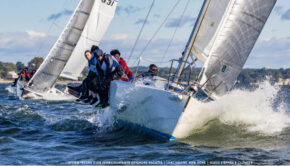
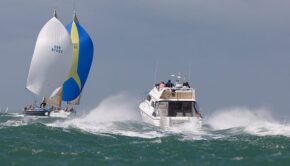
 We’ll keep your information safe.
We’ll keep your information safe.